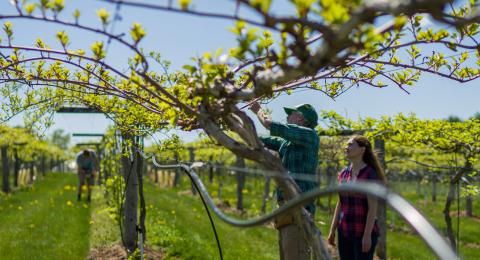Key Findings

Researchers found that harvesting variety 'Geneva 3' kiwiberries at 8.0 degrees Brix produced the highest quality berries after cold storage. Berries harvested at 8.0 Brix and stored for 4-6 weeks maintained their marketability the longest and reached the best sugar levels.
About the CO-Author

Iago Hale, Associate Professor of Agriculture, Nutrition and Food Systems
Contact information: Iago.Hale@UNH.edu, Hale Lab website
This research first published in HortScience.
Researchers: A. Mumford, E. Pliakoni, I. Hale
While interest in kiwiberries as a new crop for farmers is growing, there’s still limited information on the best time to pick and store the fruit. This is especially true for the variety 'Geneva 3', which is the currently recommended variety for Northeast growers. Determining the ideal time to harvest is critical as it can impact fruit taste and marketability. If picked too early, a kiwiberry will not ever reach its peak ripeness. If picked too late, however, its long-term storability will be compromised. Fortunately, new research led by Hale and published in the journal HortScience offers insight into ideal harvesting and storing conditions for the ‘Geneva 3’ kiwiberry variety.
Growing Kiwiberries: Ideal Storage Conditions
Under Hale’s guidance, former UNH graduate student Aislinn Mumford ’22G, now a Ph.D. candidate at Louisiana State University, measured harvest and storage conditions over a two-year period using ‘Geneva 3’ kiwiberries from UNH’s research vineyard. Fruit was picked at three different times based on a range of soluble sugar content levels (i.e., °Brix levels): 6.5, 8.0, and 10.0 °Brix. Following cold storage for 4 or 6 weeks, the fruit was ripened at room temperature and its sugar content, firmness, appearance, and tastiness were monitored and measured.
“Farmers need clear recommended practices regarding when best to harvest and how best to store and ripen the fruit. This study begins to address these basic gaps in knowledge.” ~ Iago Hale, associate professor of agriculture, nutrition and food systems
In collaboration with Eleni Pliakoni, a professor of urban food production at Kansas State University, the scientists found that picking the fruit at an average of 8.0° Brix (~8% sugar) was ideal. Fruit picked with less sugar didn't taste as good and exhibited physiological damage in storage. Fruit with higher sugar content did not result in better tasting fruit nor improved storability. After being held in cold storage for 4 weeks, the fruit picked at 8.0° Brix reached ready-to-eat ripeness after about 3 days at room temperature. After 6 weeks of storage, this ripening period dropped to 2 days. Overall, the study found that fruit picked at 8.0° Brix could be stored for at least 6 weeks and still meet consumer expectations of quality.
“One of the great advantages of kiwiberries, compared to other soft berries like blueberries, raspberries, and the like, is that they are climacteric, meaning they can be harvested rock-hard and ripened off the vine,” said Hale. “This is important in a region like ours where soft fruits in the field are susceptible to damage from fruit flies, like spotted wing drosophila, and other pests and diseases—not to mention abiotic stresses.”
“To take full advantage of this great characteristic, however, farmers need clear recommended practices regarding when best to harvest and how best to store and ripen the fruit,” Hale added. “This study begins to address these basic gaps in knowledge.”
You can read the published article,?Effects of Harvest Maturity on Storability, Ripening Dynamics, and Fruit Quality of ‘Geneva 3’ Kiwiberries, in HortScience.
Funding: This material is based on work supported by the NH Agricultural Experiment Station through joint funding from the?USDA National Institute of Food and Agriculture?(under Hatch award number 1017760) and the state of New Hampshire.

